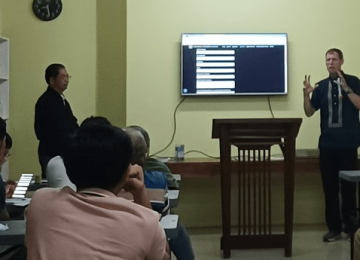Graduate-Level Missions Curricula for Teaching Cross-Cultural Ministry Leadership

With our curricula, Christian colleges and institutions can equip leaders for the nations with advanced ministry education
Looking for a missiology curriculum online for your students or members?
Global missions require more than passion—they demand preparation. At Life Development International (LDI), we believe that teaching and equipping leaders for global ministry includes theological grounding, cultural intelligence, and practical leadership skills. That’s why we’ve developed the Global Leadership Platform: a graduate-level missions curriculum designed to prepare pastors, church planters, and ministry leaders to serve effectively across cultures.
Online missions curriculum
This curriculum is ideal for Christian colleges, seminaries, and ministry training institutions seeking to offer a robust, flexible, and globally accessible missions track. Whether your students are preparing for full-time missions, bi-vocational ministry, or leadership in multicultural contexts, our program provides the tools they need to lead with clarity and conviction.

Tomorrow's Leader's are Today's Youth
We have passion that the Next-Generation of ministry leaders be ground and competent. So, whether you’re preparing for a short-term trip or a lifetime of service, LDI helps you grow through cross-cultural leadership training, experiential missions programs, and coach-led development tracks.
Online Seminary Missions Track—Accessible Anywhere
Our platform is fully digital and optimized for mobile access, allowing students to engage with the material from anywhere in the world. Whether they’re in a classroom, on the mission field, or balancing ministry and family life, learners can progress through the curriculum at a pace that fits their calling and context.
The curricula can be co-branded for smooth integration within your school or organization. It is fully digital and optimized for mobile access, allowing leaders to study from anywhere in the world. Whether your students are pursuing a cross-cultural ministry degree or a graduate certificate in global missions, our curriculum is designed for flexibility and global ease while maintaining both depth and quality.
Curriculum Overview: Theology, Leadership, and Cultural Engagement
Training topics include:
The Global Leadership Platform includes a series of integrated courses that build a strong foundation for cross-cultural ministry. Each course is designed to deepen theological understanding, sharpen leadership skills, and enhance cultural awareness. Core courses include:
Pastoral Foundations for Global Ministry Explore the biblical and theological basis for missions, with a focus on shepherding in diverse cultural contexts.
Worldview and Apologetics Learn how to engage with different belief systems and communicate the gospel with clarity and respect.
Cross-Cultural Care and Communication Develop skills for navigating cultural differences, building trust, and ministering across boundaries.
Strategic Project Leadership Gain tools for leading teams, managing projects, and implementing ministry initiatives in global settings.
Church Planting in International Contexts Study models and strategies for planting healthy, reproducing churches in cross-cultural environments.

Ready to Equip Global Leaders?
If your institution is ready to expand its missions training or offer a flexible, high-quality curriculum for cross-cultural ministry, we’d love to talk. The Global Leadership Platform is more than a set of courses—it’s a strategic investment in the future of global leadership. Contact us today to explore how this curriculum can serve your students, your church, and the nations.

Designed for Emerging and Veteran Ministry Leaders
This curriculum is built for a wide range of learners. Whether you’re a young leader trained in the local church or a seasoned pastor with years of experience, the Global Leadership Platform will stretch and strengthen your capacity for global ministry. The content is academically rigorous yet accessible, making it ideal for those pursuing a graduate certificate, a Master of Ministry degree, or continuing education in missions.
Our program is also well-suited for missionaries preparing for the field, church leaders working in multicultural communities, and educators training the next generation of global workers. With a focus on both theory and practice, students leave equipped to teach, lead, and serve in complex ministry environments.
Related: Want a Masters Degree with a Cross-Cultural Focus?
If you’re not looking to offer curricula through your own institution, you can still benefit from the curriculum via our partnership with Newbridge Leadership Institute. Newbridge offers a Master of Ministry (M.Min) degree that uses the LDI curriculum as its foundation. This is a great option for individuals or churches who want to access graduate-level training without building a program from scratch.
Learn more about the M.Min degree through Newbridge Leadership Institute.

